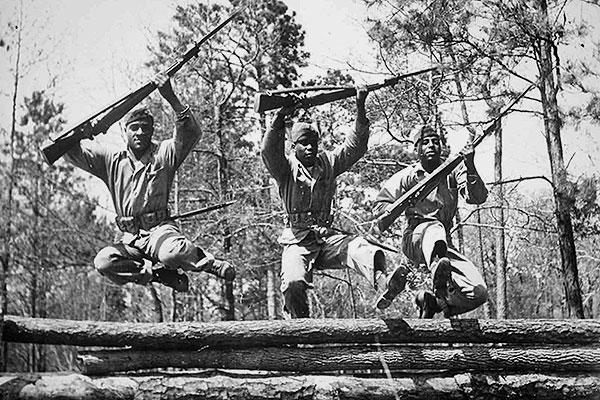Over 21,000 Blacks who trained at Montford Point, North Carolina, all proved that they were real Marines, many of them at places like Iwo Jima.
In one story, from May 1943, a young man in $54 dress blues just wanted to get away from base and the stress of wartime, take some liberty and see his family. But when he got to Cleveland, Pfc. R.J. Wood was arrested and charged with impersonating a Marine, according to Bennie J. McRae's "The Montford Point Marines" website.
Like most Americans at that time, the Cleveland police had never seen a Black Marine before.
Today's Marine Corps, like its sister services, is fully integrated, but for decades, the Marines did not admit Blacks. In 1941, President Franklin Delano Roosevelt signed Executive Order 8802 to establish the Fair Employment Practice Commission, banning discrimination "because of race, creed, color, or national origin" in all government agencies.
Recruiting for the "Montford Marines" began on June 1, 1942. Thousands of African-American men, eager to serve, flocked to recruiting offices. The quota of 1,200 men were housed in prefabricated huts near segregated Jacksonville, N.C., where railroad tracks divided white residents from black. The troops at Montford experienced racism again and again. For example, unless accompanied by a white Marine, these men were not allowed to enter Camp Lejeune.
By 1945, all drill instructors and many NCOs at Montford Point were black. The Montford Marines performed well in their duties at home and abroad, despite the strictures placed on them by society in their era. In practice, these men surpassed all anti-aircraft gunnery records previously set by Marines, and named their weapon "Lena" after their favorite singer, Lena Horne.
Most important, the men of Montford Point made it impossible for the Marine Corps to return to its prewar policy. President Harry S. Truman eliminated segregated units in 1949. But the Montford Point Marines have not been forgotten. In 1998, Parris Island drum major Staff Sgt. Vernon Harris composed the music to a song, "I'll Take the Marines," commemorating the group. The words had been written by a Montford Marine, LaSalle Vaughn. "If African Americans at that time could go through the rigorous training of Marines when it was segregated and they were looked down on and still be proud Marines … it encourages all Marines to look forward and recognize our progress," Harris said.
Want to Know More About the Military?
Be sure to get the latest news about the U.S. military, as well as critical info about how to join and all the benefits of service. Subscribe to Military.com and receive customized updates delivered straight to your inbox.















